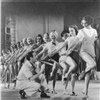As dance teachers we are clear on our role to teach our students proper technique and performance skills. However, as generations are continually changing, so is the world in which they are growing up in. Perhaps a traditionalist to some extent, it is my belief that certain etiquette, good habits and respect for the dance studio is becoming a lost value within some training programs. Furthermore, while the dance studio is many times a student’s “home-away-from-home,” we also become example-setters; instilling rules, discipline and boundaries of our own for the welfare of our students. While it is a fine line to be cognizant of what some parents could misconstrue as overstepping their parental rights, it is always important to reassure them and be clear that the studio and teachers’ mission is undoubtedly in the best interest of their children and studio community. In essence, we are helping to not only train the dancer but also produce polite, humble and respectful professionals. In my experience, parents most often come to appreciate this reinforcement of lesson implementation; which they are already trying to instill at home. This consistency and follow-through are always recipes for success.
As a new dance season is upon us, this is a great time to start applying those “lessons within the lessons” that will create individuals who come to understand the importance and value of all that they are being taught. Where self and mutual respect is essential to preparing future professional dancers, it is equally important for us to play an integral part in nurturing well-rounded human beings as well. Below are some ideas I’d like to share for creating an environment in your class and studio that will no doubt do a few things:
- The Dress Code: Instilling and maintaining a dress code throughout the year can sometimes be challenging. Set the expectation from the beginning of the year with letters home to parents and well as discussion (and/or contracts) with your students as well. Pose the question to them as to why they think dress code is important. Not only does it help you, the teacher, to create a uniform look in class; making it easier to spot corrections and body-line, but remind them that when one looks like a dancer and feels like a dancer, they are more apt to dance like a dancer; especially when they look around the room and see everyone looking professional and ready to learn. For your older ones, encourage them to take responsibility to pack their own dance bags the night before; making sure everything is clean, washed and ready to go for the following day. At a certain point, they shouldn’t be blaming mom or dad why their tights were left in the dryer or that their mom forgot to pack their shoes. If a student in this day and age is capable of taking care of and maintaining their IPODS, IPADS, IPHONES, Blackberries, Facebook, Twitter, etc, etc, etc, they can be responsible to be prepared for their dance class. And if they’re not, set the repercussion and be sure to follow through with it each time.
- Etiquette Before Class: Get your students into the habit of coming into class on time, if not early when possible. While it’s certainly acceptable for them to chat softly with friends and have their daily “catch-up” before class, they can do it in a constructive manner by also stretching and focusing on their body needs before you get into the studio or while attendance is being taken.
- Etiquette During Class: Remind students it is never OK or respectful to sit, lay down or talk while a teacher is giving choreography or giving notes or while another group is dancing. Students should remain “active” and “present” by observing fellow dancers and reviewing choreography in their heads or marking it for themselves. Especially when going across the floor, make sure dancers are aware of how to count themselves in to keep the flow of the exercise going. I have also found it is extremely beneficial for dancers to always bring a notebook into class with them to write down choreography, notes you give them, vocabulary words, etc. Have dialogue about their observations as well. Get dancers into the habit of becoming “thinking” dancers; where they are able to talk about dance and critique in respectful, constructive and articulate ways. Conversely, help them to become receptive to receiving feedback and critique as well. Reinforce the notion that it is a positive occurrence when a teacher acknowledges you in any capacity, and should be taken with appreciation and the best intention in which it was given.
- Etiquette at the End of Class: While ballet class often has a “reverence” to pay respect to and acknowledge the teacher and accompanist while honoring the ballet tradition, it is also wonderful to set the tone for this in other genres. Demonstrating mutual respect by simply thanking your dancers for their hard work and dedication and having dancers come up and give thanks to you as well for class is a thoughtful way to show appreciation and exemplifies good manners all around.
- During Down-Time: During break-time, make sure your dancers keep chatting to a volume that is not disruptive to other classes going on. If they are walking in the hallways or sitting outside the studios be clear on rules you establish for safety, picking up after oneself, etc.
Hopefully some of the ideas above are helpful steps you can take to transform your environment into a positive, energizing place where you are developing the emerging dance professional in the truest sense; as well as individuals who value hard work, etiquette, respect & gratifying reward!
Here's to a rewarding & successful new season! Dance it out!
See you all in the dance studio!
Jessie

